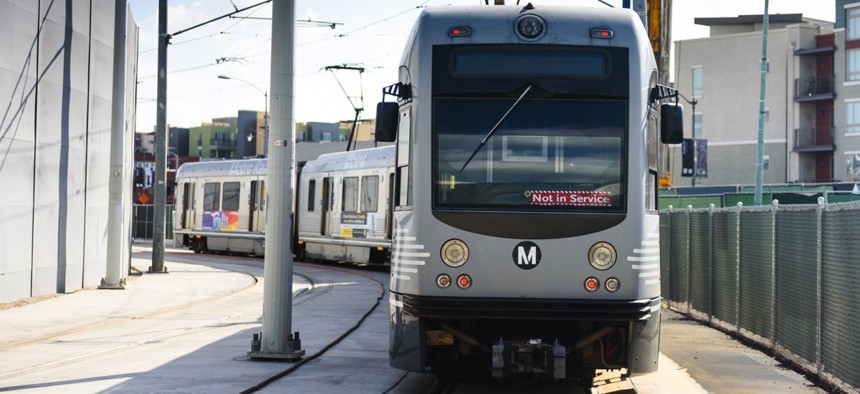Transit Advocates Question If Trump Administration Withholding $1.4B in Local Grants


Connecting state and local government leaders
The Federal Transit Administration said most projects haven’t met the grant requirements for consideration yet.
A transit advocacy group criticized the Trump administration Monday for failing to distribute the bulk of $1.4 billion appropriated by Congress in March for 2018 transit construction projects.
Transportation for America, which represents elected officials, transit companies and civic groups, launched a real-time clock showing what they called an inexplicable delay.
Transit priorities have been notably absent from President Trump’s budget and infrastructure proposals, and the Federal Transit Administration has only awarded $25 million of the obligated transit construction funds as of Monday, according to T4A.
“From their perspective, there's no downside to slowing these projects down,” Beth Osborne, vice president of technical assistance at T4A, told Route Fifty. “If you slow them down, they go up in cost, and local communities have to find a way to fund them.”
Grants for shovel-ready transit projects years in the making have been delayed to the last minute, only those previously guaranteed money are funded, and no new full-funding grant agreements have been signed, Osborne added.
Funds in question are specifically for New Starts, Small Starts or Core Capacity transit projects under the Capital Investment Grants Program.
The FTA disputed that the projects were ready to move, saying the agency is following the correct process and evaluating the Capital Investment Grant projects.
“It is inaccurate to imply the projects listed by Transportation for America are ‘ready-to-go.’ None of the projects listed have met the requirements in law for receipt of CIG funding,” an FTA spokesperson, who declined to be named, said in an email.
Before receiving a CIG grant, sponsors must obtain commitments on all other funding, complete all “critical” third-party agreements, develop a “firm and reliable” cost estimate, “satisfactorily demonstrate” the technical capacity to undertake the project, and have it receive a medium or better rating from FTA, the FTA spokesperson added. Then there’s a congressional review.
“The most advanced projects on the list are in the grant document preparation phase, while the majority of the projects on the list have critical items left to complete before a grant can even be considered,” the FTA spokesperson said. “For example, it was recently determined the vehicles planned for the Madison Street BRT project cannot climb the hills in Seattle, so engineering/design work remains to be completed.”
Projects under the New Starts umbrella cost more than $300 million and seek more than $100 million in federal funding, while Small Starts cost less than $300 million and require less than $100 million. Core Capacity projects involve transit systems at or over capacity within five years and must increase that capacity by at least 10 percent.

Currently, 14 localities encompassing 17 shovel-ready projects haven’t received grants, according to T4A: Albuquerque, New Mexico; Dallas and El Paso, Texas; Jacksonville and St. Petersburg, Florida; Los Angeles, Orange County and Sacramento, California; three projects in Minneapolis; New York City; Reno, Nevada; two projects in Seattle; Gary-Michigan City, Indiana; St.; and Tempe, Arizona.
Projects range from bus rapid transit installations to light rail extensions to adding streetcars. In an email, SoundTransit in Seattle said, "While federal funding for capital public transportation projects remains at risk, Sound Transit continues to work diligently with our federal partners to secure our agency’s $1.17 billion Full Funding Grant Agreement."
FTA has signed 10 CIG Program grant agreements totalling $1.9 billion since 2017 and made $10 billion in fiscal year 2018 formula funding and $534 million in other competitive program funding available, the FTA spokesperson said.
Osborne countered that her group is focused on 2018 money, but noted that the agency hasn’t “spent all the FY 2017 funding either.”
“It’s hard to know anyone who would have standing to demand that funding that has not been committed,” she added.
Transit agencies with existing contracts with the federal government could take the Trump administration to court if existing commitments aren’t honored.
Osborne said she hoped T4A’s clock might encourage FTA to better explain where it is in the project review process because it failed to submit a list with the budget, unlike previous administrations.
“The only punishment Congress can impose is to take the money away,” Osborne said. “And that’s what the administration wants.”
Editor's note: This story was updated with a comment from SoundTransit.
Dave Nyczepir is a News Editor at Government Executive’s Route Fifty and is based in Washington, D.C.

NEXT STORY: Microsoft brings Azure Stack to Government Cloud





